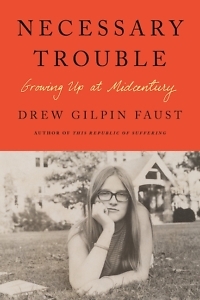History Happens
Drew Gilpin Faust recalls growing up in the 1950s and ‘60s
Opposite the title page in Drew Gilpin Faust’s Necessary Trouble: Growing Up at Midcentury is an image of a letter the future historian and president of Harvard University wrote to President Dwight D. Eisenhower.

“I am nine years old and I am white and I have many feelings about segregation,” she printed in pencil on lined notebook paper. If she were Black, she told the president, she could not go to many public schools, though “my feelings haven’t changed, just the color of my skin.”
She asked Eisenhower to “please try” to have “schools and other things” accept Black people.
The letter foreshadows the convictions that would shape Faust’s life as a teen and young adult. The girl known as Drewdie Gilpin grew up in a privileged rural Virginia family, daughter of parents who “rode to hounds,” as hunting on horseback with dogs was called. Her father’s image appeared in Esquire in 1940, when he was an undergraduate at Princeton. (He looked, she quipped, like he had been “invented by F. Scott Fitzgerald.”) Her mother attended a prominent girls’ school in Italy “to become a lady.” Faust might have followed her lead if she had not been so adamant about forging her own way.
That wasn’t easy to do. In the cultural milieu surrounding the family farm on Virginia’s Lee-Jackson Highway, named for Confederate heroes, “ideas about white southern womanhood lingered tenaciously.” There, Faust “grew up in the constant company of Black people” who cooked and cleaned but from whom “unspoken hierarchy required our distance.” That white people had “better houses, better education, a better future” was a given.
“But life is not timeless,” she writes. “History happens, and it was happening in the American South.” Her own epiphany came one afternoon when Raphael, a Black servant, drove her to school. Riding along, they heard a news story about segregated schools. Noting Raphael’s discomfort, Faust went home and wrote her letter to the president, which she later found, as an adult, among manuscripts in the Eisenhower Library.
 Like any good historian, Faust has done her research, blending archival materials with her own memory. One chapter, “Life in the Fifties,” draws on other historians’ scholarship, Life magazine, and My Weekly Reader, a children’s newspaper she recalled from elementary school. Another, “Girls Who Dare: Nancy, Anne, and Scout,” is a paean to three midcentury female role models. Nancy Drew, Anne Frank, and To Kill a Mockingbird’s Scout Finch would seem to have little in common, but to young Drewdie they were alike in their originality, strength, and plainspokenness. From the pages of their respective books, they took her, vicariously, out of Virginia.
Like any good historian, Faust has done her research, blending archival materials with her own memory. One chapter, “Life in the Fifties,” draws on other historians’ scholarship, Life magazine, and My Weekly Reader, a children’s newspaper she recalled from elementary school. Another, “Girls Who Dare: Nancy, Anne, and Scout,” is a paean to three midcentury female role models. Nancy Drew, Anne Frank, and To Kill a Mockingbird’s Scout Finch would seem to have little in common, but to young Drewdie they were alike in their originality, strength, and plainspokenness. From the pages of their respective books, they took her, vicariously, out of Virginia.
She ventured far from Virginia for real in 1963 as part of a high school tour to Eastern European countries considered unreachable for most Westerners during the Cold War. After meeting other teens whose concerns mirrored her own, she arrived home just in time for the March on Washington. The following summer, a trip to the Deep South, organized by the leader of the Eastern European tour, parlayed her new global perspective into work with the Civil Rights Movement.
Of all the chapters, “The Class of 1968” most vividly evokes a world on the cusp of change, particularly for upper-middle-class white women. Entering Bryn Mawr in 1964, Faust was expected to wear skirts to class, but she also joined Students for a Democratic Society (SDS), a fledgling anti-Vietnam War, pro-civil rights organization whose “Agenda for a Generation” spoke to her values. The following spring, she watched in horror as newscasts showed police violence against civil rights marchers crossing the Edmund Pettus Bridge in Selma, Alabama. Among those beaten on “Bloody Sunday” was her future friend, John Lewis, whose phrase “good trouble, necessary trouble” gave her the title of her book.
Faust called Selma “a moment of truth.” Instead of studying for midterms, she asked a friend to type her term paper and convinced her boyfriend to borrow a friend’s car so they could drive 1,000 miles south to Selma for a subsequent march. She knew one or two more marchers might make little difference, but “This was an issue between me and my conscience about what was necessary for me to live my life.”
Faust’s style, straightforward but never pedantic, makes the book a good read. “As a historian, I have spent much of my life listening to voices from the past and trying to use them as bridges of understanding to times distant from our own,” she writes. “Here I am seeking to be one of those voices, recounting an era that fewer and fewer living humans can remember.”
Perhaps few remember, but with its focus on cultural change and young people’s voices, Necessary Trouble is a book wholeheartedly relevant to our time.

Jane Marcellus is a writer whose published work includes literary nonfiction, critical analysis, and journalism. Her work was listed as “Notable” in Best American Essays 2018, 2019, and 2020. She is a former professor at Middle Tennessee State University.


